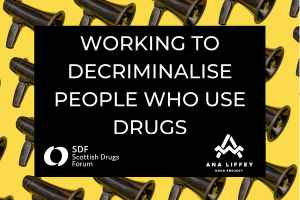Working To Decriminalise People Who Use Drugs
March 3, 2023
Today sees the publication of a new report, Working To Decriminalise People Who Use Drugs which describes how progress has been made across five different jurisdictions – Scotland, Ireland, Norway, Poland and the US State of Maine.
Welcoming the report Tony Duffin CEO of Ana Liffey Drug Project said,
“This report is very timely. Not just for the counties evaluated, but across all jurisdictions where drug policy is being debated. For example, in Ireland the Government recently established a Citizens Assembly on Drug Use to consider the legislative, policy and operational changes the State could make to significantly reduce the harmful impacts of illicit drugs and make recommendations. Available as of today, this report is a significant addition to the literature and can help to inform this debate.”
Download the report here.

There has been substantial progress in the debate on drug decriminalisation in the past 10 years, the public acceptance of decriminalisation of the possession of drugs for personal use means political debate seems less controversial and has been brought in from the margins.
Decriminalisation has gained support in different areas across the world. In some areas a consensus has been reached supporting decriminalisation and on how legislative and other changes may better serve the public. However, elsewhere there continue to be barriers to ending criminalisation and preventing the consequent harms to people who use drugs, their communities and wider society.
Funded by the Open Society Foundation, Ireland’s Ana Liffey Drug Project commissioned Scottish Drugs Forum to undertake the evaluation and draw up the report.
The report explores the situation in each of the five jurisdictions and the lessons from the success of different projects and initiatives which have helped implement change and progress decriminalisation. The report shares the perspectives and roles of advocates, politicians, police and the media.
The report is based on interviews with stakeholders in each jurisdiction and international experts from across substance use, health, justice, research and policy fields. The process also involved a review of research and an analysis of media coverage and public attitudes toward drug use and decriminalisation.
Key findings include
- The benefits to progressing practical approaches to the decriminalisation of the possession of drugs for personal use of a public health approach to addressing and discussing drug use
- The need to clearly define terminology and the model of decriminalisation being advocated
- The need to clearly describe the change proposed in terms of police and criminal justice practice and what the state would do in practice
- The need to describe practical benefits for all stakeholders including wider communities and society
- The benefit of a collaborative approach in advocacy involving politicians, people who use drugs, advocates, police, health representatives
- The crucial role of media in public perceptions of the debate around decriminalisation and on public views about people who use drugs and the stigma born by people who use drugs
Katy MacLeod from Scottish Drug Forum, the principal researcher on the project said:
“This report shows that people understand decriminalisation to include a variety of measures. These range from alternatives to punishments like fines and imprisonment; diversion to health interventions or treatment; to drug possession no longer being a criminal offence at all.
“To make progress on decriminalisation, policy makers, the media and the general public need to be fully informed and have a shared understanding of what the specifics of any policy change are and the impact for individuals and society as a whole.
“It is clear from the findings that there is an appetite across people working in health, police, policy-makers and indeed wider society, to end the criminalisation of people and thereby reduce further and harm to individuals.”
Dave Liddell, CEO of Scottish Drugs Forum, set the report in context.
“In recent years, the necessary consensus around decriminalisation has begun to form. We fully support full decriminalisation for the possession of all drugs in Scotland. The introduction of recording warnings for the possession of all classes of drugs, including heroin and cocaine, has been an important first step but we need to go further.”
Tony Duffin CEO of Ana Liffey Drug Project in Ireland said,
“Criminalising possession of drugs for personal use disproportionately impacts on people from deprived areas, it acts as a barrier to future opportunities for people convicted, and permits negative stereotyping of people who use drugs. It’s easy to label someone a criminal in this way, but this doesn’t solve anything. There is good evidence that Decimalisation is a policy option that can help to address these issues and have improved outcomes for people who use drugs; their families, their communities and wider society.”
Duffin continued,
“Of course, in this regard, a very welcome development within Ireland’s national drug strategy, ‘Reducing Harm – Supporting Recovery’, is the inclusion of a Health Diversion Programme for those found in possession of drugs for personal use. Under this new approach – on the first occasion, An Garda Síochána will refer the person, on a mandatory basis, to the Health Service Executive for a health screening and brief intervention; and on the second occasion, An Garda Síochána will have discretion to issue an Adult Caution.”




